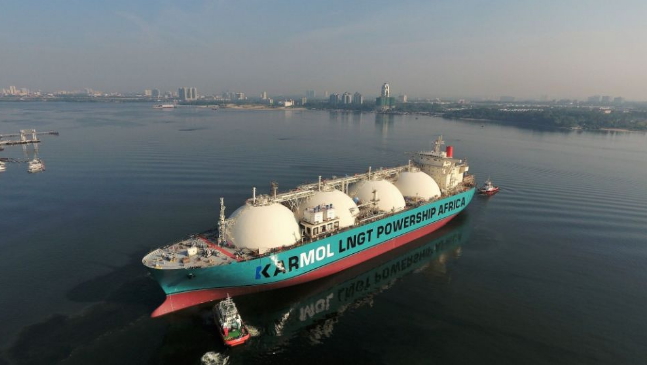One of the world’s largest operators of floating power plants is in talks to bring power to two West African countries, as onshore plans to expand access to electricity have been hit by virus-related restrictions.
Karpowership, the unit of Turkey’s Karadeniz Energy Group, which already supplies eight African countries, is using the high reliability of its mobile units to attract more clients, Managing Director Zeynep Harezi said by phone from Istanbul, where its ships are assembled.
Its vessels can hook into an onshore grid quickly, sidestepping the red-tape and construction issues involved with building a traditional power plant. And these ships come with their own fuel — liquefied natural gas and fuel oil.
“We’re hoping to put a ship in both of them before the end of this year,” said Harezi, without stating which two countries her company was in talks with. Karpowership executives met the Cameroonian Prime Minister Joseph Dion Ngute on Jan. 25 and discussed a possible deal to supply power with the country’s main port Douala, Yaounde-based Energies Media reported, citing the state broadcaster.
The pandemic is dismantling the steady progress that’s been made in sub-Saharan Africa, home to three quarters of the people who don’t have access to electricity globally, according to the International Energy Agency. For the first time since 2013, the number of those lacking power in the continent rose in 2020, when more than 590 million people lacked access. That’s an increase of 13 million people, or 2%, from 2019, according to analysis in the IEA’s World Energy Outlook 2020.
A lack of financial resources from governments and private companies, as well as operational challenges that made it difficult to deploy energy solutions amid movement restrictions are some of the reasons for the reversal, the report said.
Karpowership, which supplies nearly 1,400 megawatts to countries in sub-Saharan Africa, is seeking to provide an additional 1,000 megawatts to existing and new clients in the region this year, Harezi said.
While the pandemic has increased the appeal of its model, it also affected the company’s plans to list shares in London.
“We’ve put it to the back burner, because we’re focusing on growing the company right now, in a more flexible and agile way,” she said.
The fallout from COVID-19 has made it more difficult for some customers to pay on time, she said. “Because we’re a private company we’re able to shoulder that instead of cutting the electricity or applying the contract word-by-word,” which might call for a suspension of services, for example.
In Lebanon, where Karpowership has two floating vessels responsible for a quarter of the country’s electricity generation capacity, missed payments to the company threatened to deepen a power crisis, Bloomberg reported in July. Harezi confirmed payments were outstanding, declining to comment further.
The company is seeking to convert more of its fleet to natural gas from heavy fuel, Harezi said. It has already converted a ship that supplies 470 megawatts to Ghana. It intends to switch to liquefied natural gas in Mozambique this year, and eventually in Senegal too, she said.
“The expected start of liquefied natural gas production within a few years offshore Mozambique and Senegal will allow these countries to use domestically produced LNG, further reducing costs,” Stefan Ulrich, an analyst at London-based Energy Aspects Ltd. said by email.
“A ship (and its accompanying LNG storage unit) can relocate and start providing power to a new location within a few months,” he said.
Harezi wants her power ships to be seen as more than a quick-fix.
“A land-based power plant needs to be dismantled at the end of its lifetime, which leaves a big environmental problem in the hands of the government,” she said. “When the economic and physical lifetime of the power ship expires after 25 years we just unplug and then leave.”
Source: Bloomberg
